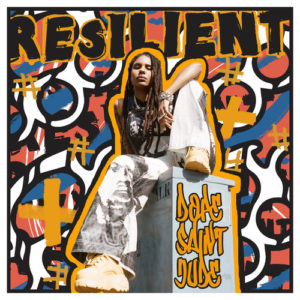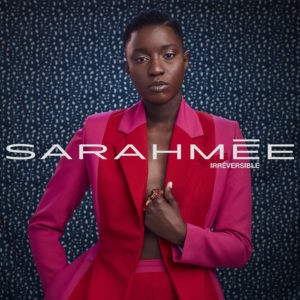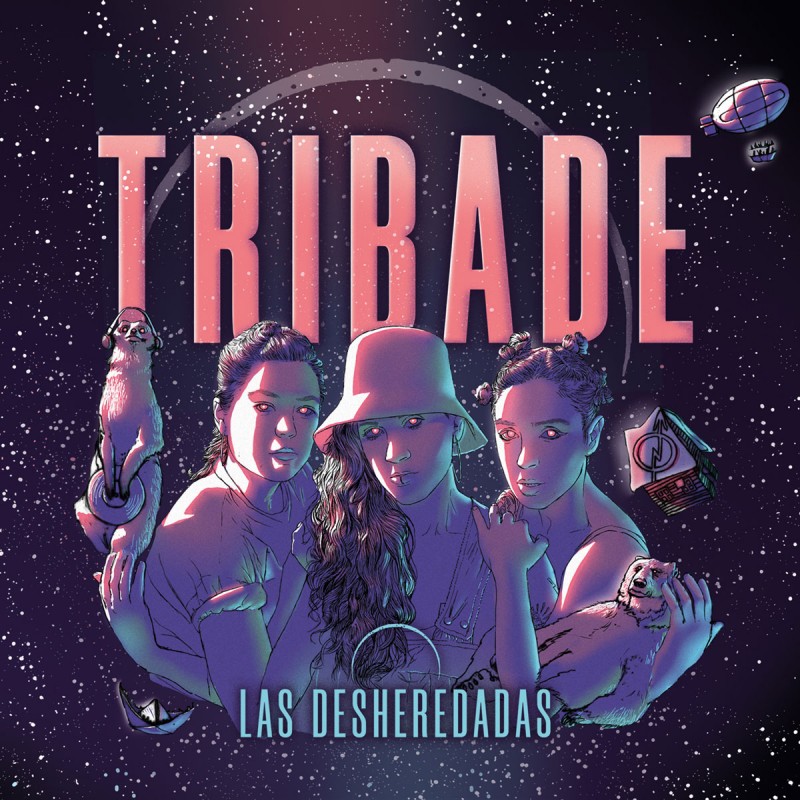NAME: La Discípula De Papa
TRACK: Gozo en mi alma
YEAR: 2019
FROM: Dominican Republic
NAME: La Discípula De Papa
TRACK: Gozo en mi alma
YEAR: 2019
FROM: Dominican Republic
NAME: Skyna
TRACK: Bye-Bye
YEAR : 2019
FROM: Grasse, France
NAME: Almaz
TRACK: Epiderme
YEAR: 2019
FROM: Paris, France
Check out our October playlist on YouTube, Spotify, Deezer and Apple Music!
With:
NAME: Holy G
TRACK: Pas beaucoup
YEAR: 2018
FROM: Saint-Étienne, France
NAME: Han Han
TRACK: Babae Ka
YEAR: 2019
FROM: Philippines/Canada
Ten days before her concert at Les Cuizines in Chelles, queer South African rapper Dope Saint Jude told us about her former drag king character, resilience and the women who inspire her.
How and when did you discover hip hop?
I discovered hip hop as a child much like many other people. My interest in it developed more seriously in 2012 after becoming a drag king. My act was based on exploring hip hop masculinity.
What made you want to become a rapper?
After I gave up being a drag king, I wanted to explore something different. And this led me to hip hop as a performance art.
What’s the story of your drag king character? Does he still exist today?
The character was called Saint Dude, based on Lil Wayne. I don’t use the character anymore.

You released the EP Resilient in 2018. How did you work on this project?
I worked on the project in London. I worked with producers and within a week I created the EP.
In which ways are you resilient?
I believe we are resilient in some way. I have been able to overcome difficult circumstances throughout my life and keep pushing.
You released the video Inside last June that talks about the weight of appearance and oppressive beauty standards for young girls. How did these diktats impact you as an artist?
I have always wanted to define my own artistry and within that, my own idea of beauty. I truly believe that beauty is exuded from within. So my aim is to find inner peace and beauty within myself. This search is part of my artistic process.
You’re often presented as a queer rapper. Do you identify as such? What does the word “queer” mean to you?
Yes I identify as queer. Queer is anything outside of the cisgender binary of sexuality and gender.
Who are the women who inspire you and why?
I am inspired by Winnie Mandela, Oprah Winfrey and artists like Lizzo. I love them because they have all overcome difficult circumstances with grace and with love. They are strong, unapologetic and beautiful inside and out.
What are your upcoming projects?
I will be releasing my debut album soon, which I am very excited about.
What do you think of Madame Rap? What should be changed or improved?
I think it is a great platform. It is always great to have platforms that celebrate us. I would encourage the platform to stay away from using words like “female”- as this excludes trans women.
Find Dope Saint Jude on her website, Facebook, Twitter, Instagram, YouTube and live at Les Cuizines in Chelles on October 11 with Kenyan rapper Muthoni Drummer Queen !
NAME: Silent A
TRACK: Ayy
YEAR: 2019
FROM: Boston / Dorchester, USA
NAME: The Roach (Gaëlle Blanchard)
TRACK: Equality
YEAR: 2019
FROM: Toulouse, France
NAME: BandaX1dia (BX1D)
TRACK: En la mesa no se habla
YEAR: 2019
FROM: Barcelona, Spain
© Rafael Arocha
Born in Dakar and based in Montreal, Sarahmée has been active for over ten years on the Quebec hip hop scene. The rapper told us about her second album Irréversible, her writing process, women in rap and feminism.
How and when did you discover hip hop?
I discovered hip hop through my cousin, when I was 9 or 10. He gave me tapes of New York rappers where there was one song on each side. He introduced me to the Fugees, Lucy Pearl, Nas and all the East Coast rap. That’s how I fell into hip hop.
Which rappers did you listen to while growing up?
When I was 11-12 years old, I was very much into rap. I listened to everything in the 1990’s, Nèg’Marrons, Doc Gynéco, NTM, IAM, what we called hardcore rap, but also MC Solaar, (his album Prose Combat) and Passy. After discovering hip hop with US rap, I was very much into French rap.

Last April, you released the album Irréversible which is very positive and empowering. Would you say it is a feminist album?
I think Irréversible has a feminist side because when you are woman, whether you like it or not, you have this feminist thing in you. I had things to say that burned inside of me, and I said them, it just happened like that. I didn’t expect people to consider it that feminist, but yes, it gives women strength and writing it made me feel good. I needed that strength. I have a 10-year career and did many things before people started to discover my music.
I believe we live in a time when it is important that women show themselves to their best advantage, push themselves forward and support each other. We need to realize we can do anything because everything is possible. It’s just that we lack female role models sometimes.
How do you work on your tracks?
For my first album, I received beats from producers. I wrote at home and went out to record but wasn’t a big fan of the studio.
For Irréversible, from 2017, I started to work on my own, without my sound engineer. I’ve been using the software Cubase autonomously for a dozen years. The idea was to be alone to work on the flows and the writing. I had the demos of the duo TenAm, who produced the whole album. I listened to the instrumental tracks and had the mic by the computer. I didn’t write on paper. I wrote top lines and melodies and worked on the lyrics. I recorded on my own, alone with my computer, sentence by sentence.
It is a new way of working, which allows me to develop the flow and technique, I love it.
Do you have any writing rituals?
I always begin with the melody. If the chorus catches me first, I write top lines and melodies, then mumble a tune. Same for the verses. I do a lot of “play” and “stop” and listen to the instrumental. When the song is done, I put the finishing touches to the text and work on metaphors, figures of speech and punchlines.
How is the female rap scene like in Montreal?
More and more female rappers take over the Quebec scene, which feels good. For the past years, there has been a lot of newcomers, including me. People begin to understand that, girl or boy, it doesn’t change the talent, the performance and the punchlines. Talent should be central, not gender.
But there is still a lot to be done because there is a long way to go, like everywhere. In any case, I’m glad to be part of this wave and to change mentalities because we need diversity.
Right now, Quebec rap is more and more diversified in gender and styles, and it’s important. It’s not because we are girls who rap that we all do the same kind of rap.
Who are the women who inspire you?
Diam’s had this ardor and energy that I always admired, a huge talent and persistence that allowed her to dominate the rap industry in France. Despite all she’s been told through her whole career, she remained herself. In the same vein, there are Lauryn Hill, Alicia Keys and Pink, girls I’ve been listening to since I was a teenager and still follow today because there are role models. They didn’t yield to this business and pop culture that tends to hypersexualize women and Black women too. They have always inspired me and I’ve always related to them.
Do you consider yourself a feminist?
Yes, I can say that. It is something I discovered with experience and time. I really try to challenge all the stereotypes that I live as a Black woman in rap and knock them over through my work, performance, intelligence and the messages in my songs. It is a part of my mission, if I have one on this Earth. I know I represent different things for different people in the world. If my music works and allows me to travel and do good around me, it’s the goal. And if it can inspire other young women, my mission will be accomplished.
There are still a lot of stereotypes, and not only in music, but also in cinema and big companies. I think we should not neglect women’s intelligence, but unfortunately, people tend to limit ourselves to certain roles. And I don’t fit in these roles, so I’m not going to embrace them either.
What are your upcoming projects? A European or French tour coming soon?
I’m finishing a summer tour of Quebec festivals. I will be releasing a video in the next few days and other videos this fall. I will be in Brussels on October 10, opening for Lord Gasmique at the Festival Francofaune, and I will spend a few days in Paris as well. The idea is to go to French speaking countries. I was in Paris in April with Chilla for the radio show Planète Rap and I hope to come back to France, but also to Africa. So very soon yes, if it all goes right!
What do you think of Madame Rap? What should be changed or improved?
I knew Madame Rap but really checked out the website yesterday. I encourage you to go on. We need an important media that highlights female rappers and artists. It is also a great thing that it is international. I believe that all female rappers, no matter where they are in the world, live the same challenges.
Find Sarahmée on Facebook, Twitter, YouTube, Instagram and all legal digital platforms.
NAME: Tramp Queen
TRACK: Virgo Bitch
YEAR: 2019
FROM: Bunker
NAME: Popytirz
TRACK: Medina Marauders
YEAR: 2019
FROM: Tunisia
They’re called Bittah, Sombra Alor and Masiva Lulla. Along with DJ Big Mark, they form the Barcelona rap group Tribade, founded in 2017. The three queer feminist rappers told us about the birth of their trio, their album Las Desheredadas released last February and autonomous feminism.
When and how did you discover hip hop?
We discovered hip hop when we were teenagers, a special age when you absorb things really deep and you need to express yourself somehow. Rap music has something within its codes that touches some people really deeply, not only because of its discursive capacity, but because of its power and forcefulness.
How and when was Tribade founded?
Tribade was born two years ago, in 2017, in Barcelona, when MCs Masiva Lulla and Bittah met and then with the arrival of Sombra Alor and DJ Big Mark. At the time, feminist and hip hop movements began to unite in several squats.

How would you describe your music to people who never heard it before?
It is mix of speech (message) and esthetics. Culture, resistance and urban music.
You are independent artists. Is it a choice?
We have the support of Propaganda pel Fet!, an independent record label and management office and a Catalan cooperative with a long history of supporting alternative and committed artists. This support does not bring any contradiction to us, because we share the way we understand both music and the music industry.

You released the album Las Desheredadas last February. Who are these “desheredadas”?
Ces “défavorisées” sont toutes les femmes qui se battent contre le système et contre sa simple existence. Toutes celles qui sont en dehors de la norme et de la loi, à qui on dicte ce qu’elles sont censées être socialement parlant.
The track La Purga is a strong queer and feminist anthem. How was it received in Spain?
Originally, we thought that La Purga would be strongly criticized… Not from outside the feminist movement but criticized within the feminist movement itself; and we must say that in fact we made this song aiming for a stronger sorority. The point is that after launching the song, we received a massive positive feedback that opened a necessary debate on this topic.
Was the video shot in a real church?
Yes, the video was shot in a real church, which is now desacralized and belongs to the Catalan Cinema Institute.
Do you identify as queer rappers?
We may identify ourselves as queer rappers when understanding “queer” as an autonomous feminism that includes all the trans, dissident and gay identities under the ideas of antiracism and anticapitalism.
What kind of feminism do you most relate to?
We support and relate to autonomous feminism, a feminism that takes into consideration various oppressions, and therefore, to intersectional feminism. And also a feminism that sees patriarchy and racism as crucial parts of capitalism when perpetuating oppression.
What are your upcoming projects?
We are focused on constantly improving our live show and working on new featurings and collaborations with other bands we feel keen on. We are also always trying to experiment with new sounds, getting deeper in new speeches and concepts as well as debates and visual identities.
What do you think of Madame Rap? What should be changed or improved?
We find this a very interesting and successful idea. There are not that many media exclusively devoted to rap made by women. As far as we’ve seen, in France, the visibility for women on the rap scene is miles ahead from Spain: for instance, a few years ago, before launching Tribade, some of us performed at the Femcees Fest in Saint Etienne, an international event for female rappers. So, lots of love and support for Madame Rap and thanks for your interest!!!!
Find Tribade on their website, Facebook, YouTube, Instagram and Twitter.
NAME: Ayelya
TRACK: Je fais
YEAR: 2019
FROM: Mantes-La-Jolie, France
NAME: Tsugumi
TRACK: Nail Gossip
YEAR: 2019
FROM: Japon
https://www.youtube.com/watch?v=oBwWtlxYMOU
NAME: Artemisa
TRACK: Libre Albedrío ft. Miss Ángel
YEAR: 2019
FROM: Valencia, Spain
NAME: Amy J
TRACK: Me And Mine
YEAR: 2019
FROM: USA
NAME: Bau Bô
TRACK: Freestyle (CRASHTEST #7)
YEAR: 2019
FROM: Paris, France